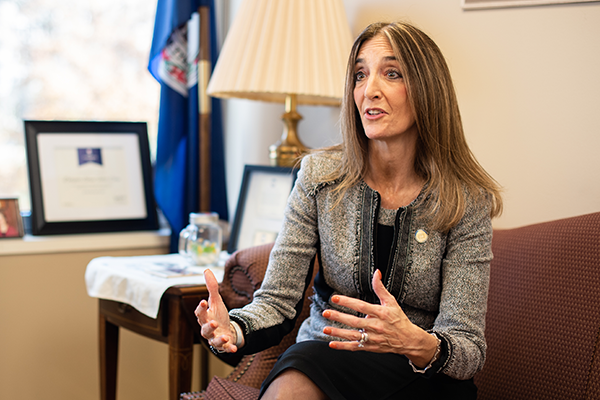A new voice
Virginia’s first female speaker prepares to gavel in the GA session
Kate Andrews //December 30, 2019//
A new voice
Virginia’s first female speaker prepares to gavel in the GA session
Kate Andrews //December 30, 2019//
For the first time since 1993, Democrats are in charge of Virginia’s legislative and executive branches. Back then, Gov. L. Douglas Wilder was serving the last year of his four-year term and Thomas Moss Jr. of Norfolk was the speaker of the House of Delegates.
Del. Eileen Filler-Corn, D-Fairfax, faces a totally different landscape as she begins her term as Virginia’s first female speaker of the House of Delegates this month. With more women than ever before serving as state legislators — as well as greater racial, ethnic and religious diversity in this year’s General Assembly — Filler-Corn, 55, says the statehouse finally reflects the commonwealth’s rapidly changing population.
Her party also has changed its ideological makeup, with more progressive lawmakers mixed in among moderate Democrats such as Gov. Ralph Northam.
Among the top issues for this session, which convenes Jan. 8 and is set to adjourn March 7, are universal background checks and other gun legislation, ratification of the Equal Rights Amendment, setting redistricting policy ahead of the 2020 U.S. Census and examining Virginia’s minimum wage and right-to-work laws.
First elected in a 2010 special election by a margin of just 37 votes, Filler-Corn worked as deputy director of the Virginia Liaison Office during the Warner and Kaine administrations and has served as director of government relations at Arlington-based lobbying and consulting firm Albers & Co. since 2007. She lives with her husband and two children in Fairfax County. Last year, she was chosen as the House of Delegates’ minority leader, becoming the first woman to lead a party caucus in Virginia’s history.
In November 2019, following the election that handed Democrats control of the General Assembly, she became the designated speaker, succeeding Republican Del. Kirk Cox.
Virginia Business spoke with Filler-Corn in early December about her goals for the 2020 General Assembly session.
Virginia Business: Why do you think this was the year that Virginia Democrats regained total control of state government after almost 30 years, allowing you to become the first female speaker of the House?
Eileen Filler-Corn: It’s been a long time, hasn’t it? I became the first female leader of either party last year. I think it’s very exciting on many fronts. It’s exciting because we have the most diverse caucuses we’ve ever had, the most diverse body we’ve ever had. It’s about time that [legislators] actually reflect the commonwealth and that we look like the commonwealth. That means all kinds of diversity.
I think we made tremendous strides in 2017 when we elected what was then our most diverse class ever — talk about capable and confident, impressive, diverse in thought and in issues and experiences as well! Also, diversity as it relates to background, race and gender. I’m excited … we made such strides [in 2017].
After the [last] session, it became clear that wasn’t sufficient. We championed so many issues that were so important to us, and we were unable to move forward. We worked hard and recruited some fabulous candidates and won the elections. I think Virginians spoke loud and clear.
VB: The Democratic Party has changed a lot, both here and nationwide, since 1993. Some Dems are progressive, while others are moderates. How do you plan to reconcile these different points of view?
Filler-Corn: I think what makes us able to succeed … is our diversity. We look at diversity as a benefit, and it makes us stronger. Will it be more challenging because we have the diversity of views? Perhaps, but that’s the democratic process.
When we talk about issues and what’s most important to us, as you saw this past session, we’re not afraid to stand up for equality and equity and treating everybody with respect, regardless of the color of their skin, the language they speak, who they love, where they come from and the religion they practice. That’s important to us, and you will find that’s important to the entire Democratic caucus.
Look at the environment. Talk about something that we hear every single day. What could be more important than clean water or clean air? I think the voters spoke loud in here. They want their elected officials to do something about that.

VB: What do you consider your primary role as speaker? How does that differ from being minority leader?
Filler-Corn: I think my focus as [House Democratic Caucus] leader was to bring everybody together, make sure that our members felt heard, make sure they were part of the process and that we were able to highlight and elevate each of them because they have such a diversity of experiences and expertise. As speaker, there’s that role as well, but [there’s] also my ability to bring people together and make sure that we are able to do good for Virginians throughout the commonwealth.
VB: What are your feelings about making compromises with those across the aisle and with members from different districts?
Filler-Corn: That’s what I said this entire campaign: We will be bold, we will move forward and make a difference in the lives of Virginians based on the issues that we know are important. Compromise and working with everybody are always part of the equation.
VB: What are the top three issues for you during the session?
Filler-Corn: One of our first bills announced really focuses on the LGBTQ community and housing discrimination. When I speak with chambers [of commerce], when I speak with businesses, when I speak with CEOs, I hear from them [that] they’re coming to Virginia for so many great reasons, but they’re not going to come to Virginia unless we’re open and welcoming and treating everybody with respect.
Another issue that’s very important to us … is to increase [the] opportunity for people to exercise their opportunity to vote. There’s nothing more important than that. That is the basis of our democracy, something that we as a caucus have been championing for a long, long time.
Gun violence prevention is an issue that’s obviously near and dear to our heart … with the … recent tragedy here in Virginia Beach. We had an opportunity for a special session the governor called [in July]. We introduced eight bills, common-sense gun violence prevention bills. Unfortunately, the Republicans adjourned after 90 minutes of gaveling in, without debating, discussing or voting on any of those bills.
VB: Do you think that was a factor in Republicans losing control of the House and Senate?
Filler-Corn: I do. I absolutely do. All of us as elected officials at every level and both sides of the aisle — I would like to believe we’re in this business because we want to make a difference. We want to improve the lives of Virginians. Not only do we have an opportunity to improve Virginians’ lives, [but] we had an opportunity to save Virginians’ lives.
VB: What do you think about the “Second Amendment sanctuary” [resolutions] being implemented by many rural Virginia local governments, vowing they will defy new gun legislation?
Filler-Corn: No. 1, nobody knows what bills we’re introducing beyond the three that we’ve introduced [as of early December]. People really need to wait and see our bills and our legislation. You can get a sense just from looking at the bills we introduced during the special session on gun violence prevention. The Supreme Court has already upheld all these bills, so they will be constitutional and there are no sanctuary cities in Virginia.
VB: It’s speculated that the new Democrat majority might consider revising Virginia’s right-to-work legislation. How important do you think unions are, and what role do you think they should have in Virginia?
Filler-Corn: Unions are important and definitely have an important role in the commonwealth of Virginia. When I’m out there talking with Virginians, I pride myself on the fact that we are No. 1 for business [as designated by CNBC’s Top States for Business report last July]. That is an important distinction and something that we have worked very hard for and are lucky to maintain.
Having said that, as I travel around and talk with Virginians, I also hear [that] when it comes to workers, we’re at the bottom. I’ve said this before and believe strongly we must do better. [Editor’s note: The anti-poverty organization Oxfam America listed Virginia as the lowest ranking state for workers’ rights in a September 2019 report.]
I know there’s a lot of support for raising the minimum wage. There is a workers’ compensation bill, removing the local prohibition for collective bargaining, and there are bills focused on [project labor agreements]. There are lots of bills that will truly … raise the middle class and improve the lives of workers. That is what we need to focus on.
I took a lot of opportunities to sit down with business leaders or CEOs and with chambers and discussed these issues. Nine times out of 10 in going over each and every one of these issues, there was a lot of consensus.
VB: Will the assembly raise Virginia’s minimum wage this session?
Filler-Corn: We are definitely discussing and meeting with a lot of business leaders, small business leaders, labor unions [and] individual workers about this so we can come up with the best bill. I think what you’ll see is we’re not introducing bills until they are primed and ready. We are in the process of working out the specifics. There is a lot of support for that, and we’ll definitely be making progress and moving forward.
VB: Is $15 an hour the goal for everybody across the state, or should it differ depending on the regional cost of living?
Filler-Corn: We are definitely taking all that into consideration. A lot of thought needs to go into that, absolutely.
VB: The General Assembly will also be taking on congressional and state legislative redistricting this year. Should an independent commission oversee this process?
Filler-Corn: Wearing my hat as Democratic leader, we’ve been working on that for quite some time and introduced countless bills focused on that. Last year we came out with a bipartisan compromise, which was honestly the most progressive compromise focused on redistricting we were able to get through ever, but it was not independent.
There’s strong support for moving forward with something, and I think we’ve had time now in the past year to really look at the constitutional amendment, and we need to figure out some of the concerns from some of our members who could not support that.
We need to discuss criteria legislation, who is going to make up that commission and make sure that we have minority representation, which has not been clear yet.
VB: What is your position on the proposal to allow casinos in Virginia?
Filler-Corn: Hundreds of thousands in taxes would be a tremendous amount of money just in the commonwealth as a whole, but certainly in certain regions that have not had an influx of money to spend on education or infrastructure.
You have to weigh and balance that with the potential for some challenges that we’ve seen sometimes occur in other states with regard to gambling. I think it’s a balancing act, definitely something that needed to be studied. We need to review the JLARC study [on gaming released in November] and discuss it with our members.
VB: Gov. Northam’s governorship was in jeopardy after the blackface scandal and now, less than a year later, his party has control. What role do you think that he plays now?
Filler-Corn: There’s a lot more we can do with regard to racial reconciliation and education. The governor agrees and has gone out and really tried to focus on this issue and make a difference and figure out how can we best educate all of Virginia, and what can we do as far as racial reconciliation and … just equality and equity for all.
He has come up with several different ideas … some in the form of a bill, and some would be commissions and boards and working groups. We as a caucus welcome the opportunity to better educate ourselves and to figure out how can we move forward.
VB: Dominion Energy has had one of the strongest lobbying presences in the General Assembly in recent years. But in September, the Democratic Party of Virginia announced it would no longer accept contributions from Dominion, a position also taken by several Democratic state legislators and Attorney General Mark Herring. How much influence do you think Dominion will have in the new Democratic-controlled Assembly?
Filler-Corn: I think the bottom line is we were all elected to serve and represent 80,000 people [in each district], and [the question] really [is] disingenuous. I would say we vote based on our constituents and based on what we feel is the right thing to do.
To say that any one of us — as elected officials [who] might accept money from another individual, a company or corporation — [is] influenced in any way is not accurate, and also minimizes our integrity and our ability to gather information and synthesize the information and vote according to our conscience and what’s right for our constituents. [Editor’s note: Dominion Energy contributed $15,000 to Filler-Corn between 2010 and 2018, according to the Virginia Public Access Project. Her top contributor, Washington, D.C.-based corporate governance attorney and noted Democratic donor Ronald D. Abramson, donated nearly $150,000 to her between 2011 and 2019.]
VB: Passing the Equal Rights Amendment is a big focus for Democrats this session. If Virginia ratifies the amendment, what would be its impact?
Filler-Corn: I would say it’s definitely a top priority. It has been for us for a long time. I think you saw how important it was throughout the commonwealth, honestly the entire country. It’s hard to think that it’s taken this long to get women in the Constitution. When I speak of diversity, how important it is, there’s gender diversity as well, as I mentioned. To many of us, we were actually shocked, saddened and dismayed that it didn’t go anywhere this past session. We’re talking about gender equality, equal pay for equal work. We’re excited about that. All of America will be watching.
E

















